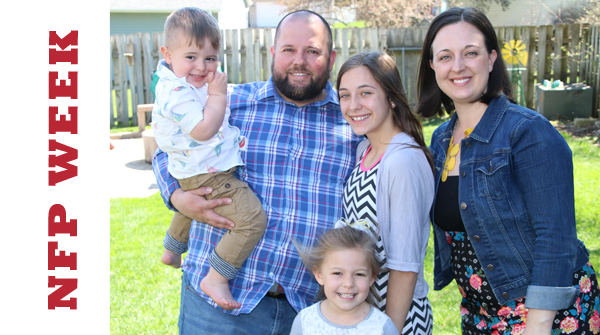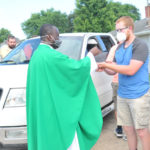Practitioner-in-training shares her appreciation for the spiritual and physical benefits of NFP

Marie Ripslinger-Atwater, right, poses for a photo with her husband, Shawn Atwater, and their children Theo, Addelyn and Macie.
By Lindsay Steele
The Catholic Messenger
(Editor’s note: National Natural Family Planning Awareness Week is July 21-27. It celebrates God’s gift of marriage and vision for human sexuality and highlights the anniversary of the papal encyclical Humanae Vitae, which was released 51 years ago on July 25.)
Growing up, Marie Ripslinger-Atwater “never really heard” about Natural Family Planning (NFP). It was something she began searching for in adulthood but didn’t discover “until I had been married for five years.”
Now, as a Creighton Model FertilityCare Practitioner intern, she wants to make sure every engaged and married couple knows about God’s plan for marriage, love and life, including the theological and practical applications of NFP.
Ripslinger-Atwater, 34, is a member of Our Lady of Victory Parish in Davenport. A wife and mother of three children, she is a chiropractor and a college biology teacher.
As a chiropractor, she said it is in her nature to search for the root causes of health problems and not simply mask symptoms. “My initial opposition to birth control was for these reasons. It shuts down a functioning reproductive system and introduces artificial hormones into the body with side effects other than suppressing fertility.”
Symptom-based NFP methods help couples identify times of peak fertility. Couples can use this information to attempt to achieve or avoid pregnancy. NFP is the only method of family planning approved by the church. Older, calendar-based methods of NFP gained a negative reputation for being unreliable, as they did not take into account the variances in a woman’s cycle. However, newer, symptom-based NFP methods demonstrate an accuracy of about 99 percent in identifying times of fertility and infertility, according to the European Society for Human Reproduction and Embryology.
For Ripslinger-Atwater, implementation of NFP was also a spiritual journey. “I became convicted of the sanctity of the marital union from writings such as Saint John Paul II’s ‘Theology of the Body’ and Saint Paul VI’s ‘Humanae Vitae.’ From these two beautiful documents, I realized that the gift of procreation given to spouses is a most sacred one that allows husband and wife to become co-creators with God of human life. This knowledge changed my heart and changed my life.”
At last, Ripslinger-Atwater and her husband, Shawn Atwater, had a method to space their children naturally, “but it took so long to find it,” she said. “I asked myself, ‘How did I not know about this? How come no one ever told me? How was I never exposed to any of this in all of my education?’ So when I finally discovered it, I was thrilled! It would prove to strain our marriage initially, but ultimately has enhanced our communication and respect for one another.”
Her heart for education and a strong desire to raise awareness of NFP as a legitimate, effective and moral means to monitor fertility pushed her to consider becoming an NFP teacher/practitioner. Marianne Agnoli, Diocesan marriage and family life coordinator, put her in touch with the St. Wenceslaus Knights of Columbus in Iowa City, who offered her a scholarship to the Women’s Health Care Matters conference at the Saint Paul VI Institute in Omaha. “There I was exposed to the rich theology behind the Creighton Model of NFP and a sliver of the science. I was awestruck by the 40-plus years of research that had gone into this method and honored to begin learning about it. I simply knew I had to go back and get more of the science so I could learn this method and teach others!”
She recently completed the first stage of Creighton Model FertilityCare practitioner training and is now in the process of completing her first supervised practicum. She will begin her second educational phase and practicum in January. By the middle of next year, she hopes to be a fully licensed independent FertilityCare practitioner.
She looks forward to working with couples, and is also interested in raising NFP awareness and creating and NFP community in the Quad Cities “so couples feel supported.”
Ripslinger-Atwater believes that NFP awareness should begin well before a couple begins picking out wedding dresses and making honeymoon arrangements. “To me, NFP is so much more than charting. It’s about fostering a respect for our bodies that are made in God’s image and likeness. If young people could begin to appreciate their fertility as a gift and learn to respect and honor it, I would anticipate a smooth transition to NFP in adulthood.”
Practical advice for transitioning to NFP
For Ripslinger-Atwater and her husband, learning and implementing NFP five years into marriage was “not without challenges. The idea of periodic abstinence during marriage was foreign to both of us.” She said the Five Love Languages quiz has been a great help in finding meaningful expressions of non-genital intimacy. She also believes that the successful practice of NFP requires prayer for and with your spouse. “God calls spouses to generosity and self-sacrificing love. We can trust that the grace available to spouses through the sacrament of marriage will help us live out this calling.”
Learn more about Natural Family Planning
Additional information on NFP can be found on the diocesan website at https://tinyurl.com/ybhfes6o or call Marianne Agnoli at (563) 888-4242.











